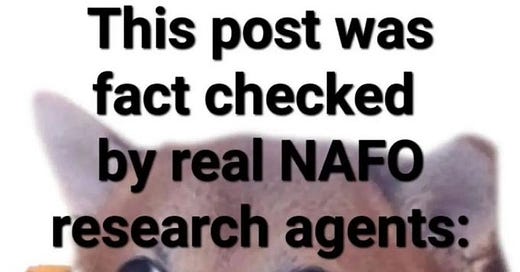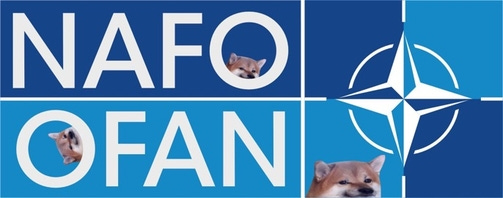NAFO and the Contact Hypothesis: How a Meme Army Built Unity Across Digital Divides
What Shiba Inus, trolling, and decentralised psyops teach us about reducing conflict in polarised times
In a world of YouTube flame wars, Telegram echo chambers, and algorithmic trench warfare, building bridges between divided communities seems quaint at best, and delusional at worst. But enter NAFO: the North Atlantic Fellas Organisation.
What started as a joke—memes with Shiba Inu avatars trolling Russian war crimes—has become an international, wildly diverse, semi-serious digital battalion supporting Ukraine. And behind the silliness lies a powerful lesson in how to actually bring people together.
What is the Contact Hypothesis?
Coined by psychologist Gordon Allport in 1954, the contact hypothesis says that under the right conditions, interaction between members of different groups reduces prejudice. Those "right conditions" include:
Equal status among participants
Common goals
Cooperation (not competition)
Endorsement from authority or norms
How NAFO Accidentally Perfected It
1. Equal Status: Everyone in NAFO is a “Fella.” Whether you’re a retired general, an LGBT activist, or a Polish memelord, your Shiba avatar levels the playing field. It's cosplay egalitarianism.
2. Common Goals: Roast Russian disinformation. Support Ukraine. Fundraise for drones. These are specific, emotional, and meme-able goals that unify rather than divide.
3. Intergroup Cooperation: Fellas team up to create art, run reply raids, crowdsource open-source intelligence, or help with translation and logistics. Everyone brings something. Everyone gets credit.
4. Normative Support: Surprisingly, yes. Ukrainian officials, NATO representatives, and even European governments have nodded at NAFO, giving it semi-official moral support. That’s not nothing.
Who's in NAFO?
A wild mix:
Former military personnel
K-pop stans
Anarchists
Baltic nationalists
Academic policy wonks
LGBT+ meme creators
Shitposters from every continent
It shouldn't work. And yet, it does.
They’re not united by ideology. They’re united by the mission, by humor, and by the simple pleasure of ratio-ing a Russian embassy tweet.
What NAFO Teaches Us
Don't force dialogue — give people a shared task. NAFO doesn't host "let's understand each other" chats. It says: here's a war criminal, let's roast him. And in doing so, people forget to hate each other.
Humor bypasses defences. You don't need agreement when you're laughing together. Memes are the emotional Esperanto of the internet.
Decentralisation fuels ownership. Anyone can be a Fella. Anyone can contribute. There are no purity tests, no leaders, and no agenda other than participation.
Social rewards > ideological conversions. People join because it's fun. They stay because it makes them feel part of something meaningful. No pamphlets needed.
Caveats & Chaos
NAFO isn’t perfect. It’s not a think tank. It doesn’t do nuance well. It trolls hard and sometimes recklessly. But its success lies precisely in this:
It didn’t try to engineer unity. It memed it into being.
And maybe that’s the secret. If you want to bridge divided communities in 2025, don’t start with powerpoint and think tanks. Start with a dog avatar, a common enemy, and a blank canvas.
https://en.wikipedia.org/wiki/Contact_hypothesis
https://en.wikipedia.org/wiki/NAFO_(group)







Excellent